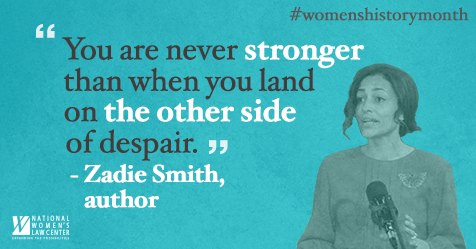Abortion rights, women of color, and LGBTQI+ people are under attack. Pledge to join us in fighting for gender justice.
She Inspires Me: Zadie Smith

 In honor of Women’s History Month, we present “She Inspires Me,” a series celebrating women whose current contributions to social, political, and cultural life are making history in the present.
In honor of Women’s History Month, we present “She Inspires Me,” a series celebrating women whose current contributions to social, political, and cultural life are making history in the present.
One week and one day after Hillary Clinton’s concession speech, I listened from the second story of Sixth & I Synagogue while Zadie Smith and Michelle Norris discussed Smith’s fifth novel, Swing Time.
History had just been made in the election, though not the kind I had imagined before November 9. I was forced to see myself in context: a white woman in America, a member of a demographic element that had mostly turned out for Donald Trump. I was acutely conscious of my role as spectator and participant in a historical moment whose significance I knew I would not wholly understand for years. But another kind of history-maker was in the room with me.
Literary history, like all history, is inherently political; people writing in English have often stained their pages with the racism, classism, and misogyny that their cultures enshrined (If you’ve read Heart of Darkness or The Sun Also Rises, you know what I mean). Reading is an invaluable empathetic exercise, but in a disproportionate number of cases, classic novels have asked women and people of color to inhabit the minds of white, male characters. The result, for me, has often been alienating: Sometimes I think I know more about how to be a white man than anything else.
Zadie Smith has written white men—and Black men, Pakistani men, and white women—with her signature humor and nuance. When writing dialogue, Smith adopts diverse voices and switches between them with prodigious ease. In fact, Smith is something of a chameleon: Each of her novels has a distinct narrative style. But Swing Time zeroes in on the inner life of its unnamed first-person narrator, a Black woman from Northwest London. The voices that reach us are all filtered through her experience.
When Swing Time was released in November, Smith was clear about her focus: “I wanted to express how it is to be in the world as a Black woman.” Her narrator watches, with humor and revulsion, the way white people appropriate Blackness. She experiences the way society shapes the lives of women, Black women in particular. And all this observation ultimately enables her to wield a formidable power.
In case it’s not clear, I’m a Zadie Smith evangelist, though Smith hardly needs my praise—she has Barack Obama and a whole host of literary critics for that. Listening to Smith speak—and reading Swing Time—so soon after the election was a welcome reminder that connection is always available to us, on the page and in our lives, if we’re willing to put in the work. There’s something incredibly exciting about watching someone write their way into history by helping to divert our literary discourse away from white boys and their dogs.
After the event, we all lined up to have our books signed. My level of fangirl intensity was about an eight on a scale of one to 10, where “one” is running into your high school prom king at Starbucks, and “10” is attending a Jonas Brothers concert in 2009. By the time my copy landed in front of Smith, I was a shaky, nervous disaster. I cracked a joke in a trembling voice while I watched her master the unusual spelling of my first name.
When I walked away, I felt almost relieved. It’s a little scary, after all, to be seen by someone so skilled in the art of seeing.

